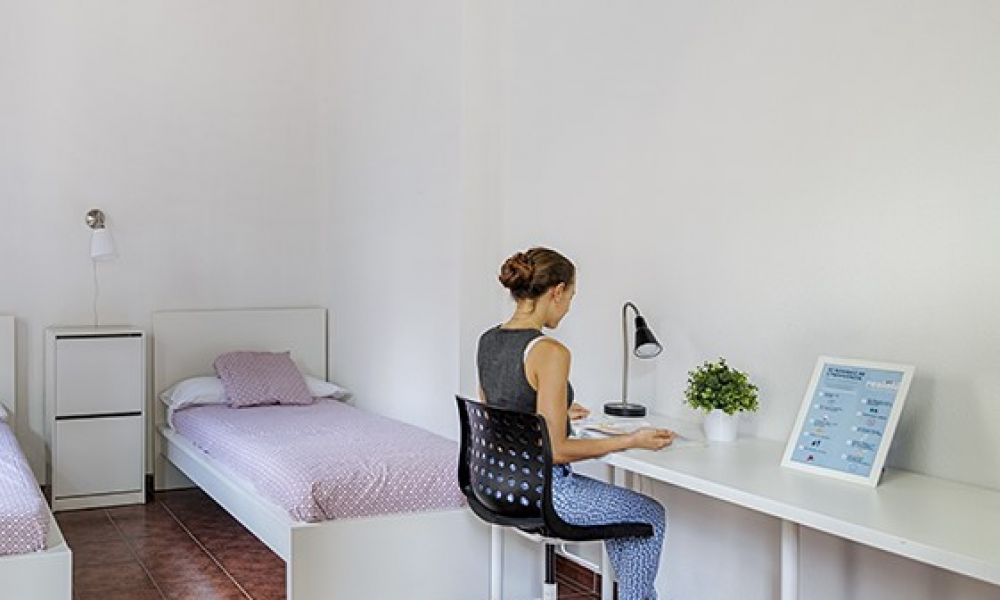Host family versus residence: what is included/not included?
It may be first necessary to better define what host family and residential accommodation are.
Host family accommodation or homestay?
The terms "host family" and "homestay" usually cover the same type of accommodation: living with a local household. It means that a local household has offered to an Educational provider to welcome a student in their home for a few times during this student's study abroad experience.
That being said, the nature of this offer can be very different:
Paid host families versus volunteer or stipended host families: when an Educational provider offers a host family or homestay accommodation, it may be a so-called paid host family, receiving a set payment to host you and provide you with a certain number of meals or no meal; or a volunteer family, who offers to welcome you but does not receive payment for this; this family may eventually receive a so-called "stipend": a small amount of money to help the family to cover some extra costs, like meals or energy for example. In that latter case, the host family does not earn any money but receives some compensation that may cover or help cover their extra costs when they host you.
Residential accommodation
Residential accommodation means that you are hosted in an accommodation that has been built to welcome a lot of students at the same time and which offers single, double or multiple-bedded rooms. The facility is rented by your Educational provider or belongs to a third party: in that case, you book a place at this residence for the time you study abroad. This type of facility also usually includes common rooms as well as catering facilities or even laundry facilities. It may include meals or no meals. It may be a supervised or unsupervised residence; the degree of supervision can also be very different:
- there can be staff supervising the student at all times, like it is the case during summer camps abroad;
- or only a guardian who looks after the facility, as it is usually the case for language schools abroad.
While those residences may be student residence or youth hostels for example, the dormitory or boarding house of a boarding school also belongs to what Educational providers call "residential accommodation": you live and study on campus, in facilities dedicated to high school students, with a daily schedule and close supervision. This type of accommodation is for example offered at Notre-Dame International High School in Paris.
Private Accommodation: what does it mean?
A private accommodation has not been built to welcome a lot of students at the same time. It is a regular flat/apartment that you rent during your study abroad experience. You pay a rental fee to the landlord, as well as cover your energy bills. This type of accommodation does usually not include meals but you have access to a kitchen and sometimes to laundry facilities.
This type of accommodation can be exclusively private: you are the only student living in this flat. But it can also be a shared flat: you live with other students attending the same educational institution, or students who maybe attend a university while you attend a language course. Situations can be very varied.
Living in a host family or at a residence: which should I choose while studying abroad?
Now that we have briefly defined what homestay with a host family versus residence means, let's have a look at the Pros and Cons. Obviously, such a choice is contingent on the type of accommodation offered by your Educational Provider.
The Educational Provider may offer:
- The choice between homestay or residence accommodation. If you choose a high school exchange in France, you can opt for a host family or a year in a boarding school. It should be noted that the two can be combined, living in a school dormitory during the week and with a French host family during the weekend.
- The choice between homestay, residence, or private accommodation. These are usually the options available in study abroad programs catering to young adults and adults, such as a language school program. For example, the Nacel English School London offers a wide choice of accommodations where you can decide to live with a British host family, in a student residence hosting local and international students, at a private apartment recommended by the school, or in a shared house with other students for a bit more fun!
- Homestay only. Some programs specifically focus on cultural exchange and, as such, only provide homestay accommodation, such as a high school exchange in Germany or Italy.
As mentioned above, the High School Study Abroad or Language Schools options, as well as the Summer Camps Abroad program, offer accommodation options. You can live with other campers in a residence, whether in a youth hostel or a student hostel, within a boarding school, or other rented housing offered by the summer camp organization. Some summer programs for high school students offer the choice between residence and homestay. For example, if you were to opt for a Spanish summer course in Spain - in Valencia - you can choose to stay with a Spanish host family or at a local student residence, as you wish!
Host family : Pros and Cons
The pros and cons listed below may help you to decide between a host family or residence. Of course, that also depends on your personal preference.
- What is your personality, introverted, discreet, or rather extroverted?
- Do you prefer the comfort and coziness of a home?
- Are you looking forward to making many new friends of your age?
- Do you really want to experience the local life?
PROS of host family accommodation ✅
- You can experience everyday life in a foreign country
- You can build real relationships with local inhabitants
- You discover the lifestyle of your hosts
- You can experience local meals, meal times, and home routines
- You can learn to feel at home away from home
CONS of host family accommodation ⚠️
- You will have to abide by your host family's rules, from living arrangements to outings
- You will have to respect your host family's routine and schedule
- You will have to adapt to your host family and participate in their family's life
- You will have to learn to live with foreign people in the same household
These are not all necessarily cons. If you are ready to make adjustment efforts, you will find this rich human experience rewarding and unique!
Residential accommodation: Pros and Cons
PROS of residential accommodation ✅
- Make friends with students of your own age from different countries and cultures
- Be immersed with people you share common interests with at all times
- Never be alone in exploring the neighborhood when having fun
- Share new and intensive moments with your international friends
CONS of residential accommodation ⚠️
- Live in a more standardized form of accommodation with fewer 'local' characteristics
- Have fewer opportunities to experience daily life in the foreign country of your choice
- Have more international meals
- Develop more international friendships than with local people
While there are disadvantages of living in residence in terms of discovering more of the local culture, many students enjoy the international experience of living with students of their own age from all over the world!
Consult our experts to discuss your options and make the best choice!


